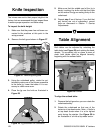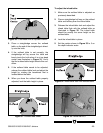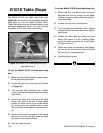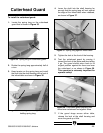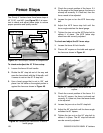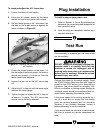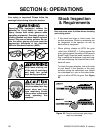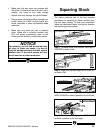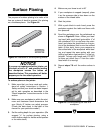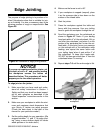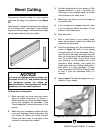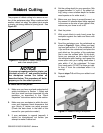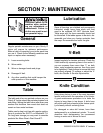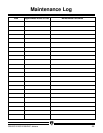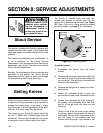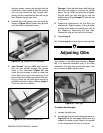
-30-
G0500/G1018/G1018HW 8" Jointers
Surface Planing
The purpose of surface planing is to make a flat
face on a piece of stock to prepare it for planing
on a thickness planer. See Figure 44.
4. Make sure your fence is set to 90˚
5. If your workpiece is cupped (warped), place
it so the concave side is face down on the
surface of the infeed table.
6. Start the jointer.
7. With a push block in each hand, press the
workpiece against the table and fence with
firm pressure.
8. Feed the workpiece over the cutterhead as
shown in Figure 45. Note—When your lead-
ing hand (with push block) gets within 4" of
the cutterhead, lift it up and over the cutter-
head, and place the push block on the por-
tion of the workpiece that is over the outfeed
table. At this point, focus your pressure on
the outfeed end of the workpiece while feed-
ing, and repeat the same action with your
trailing hand when it gets within 4" of the cut-
terhead. To keep your hands safe, DO NOT
let them get closer than 4" from the cutter-
head when it is moving!
9. Repeat steps 7-8 until the entire surface is
flat.
To surface plane on the jointer:
1. Make sure that you have read and under-
stand all safety instructions in Section 1:
Safety and that your stock has been inspect-
ed for safe operation as described in the
“Stock Inspection” instructions earlier in this
section.
2. Make sure your workpiece is within the mini-
mum and maximum stock dimensions that
your Grizzly 8" Jointer can safely process.
(Check the data sheet in the back of this
manual for your particular model.)
3. Set the cutting depth for your operation. (We
suggest
1
⁄32" for surface planing, using a
more shallow depth for harder wood species
or for wider stock.)
NOTICE
If you are not experienced with a jointer, set
the depth of cut to 0", and practice feeding
the workpiece across the tables as
described below. This procedure will better
prepare you for the actual operation.
Figure 44. Illustration of surface planing effects.
Figure 45. Surface planing the face of a
workpiece.



